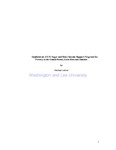Implications of U.S. Sugar and Dairy Income Support Programs for Poverty in the United States, Costa Rica and Jamaica

View/
Author
Senior, Norman
Subject
Washington and Lee University, Shepherd Poverty Program
Poverty
Agricultural subsidies
Jamaica
Costa Rica
Price regulation
Agriculture -- Economic aspects
Metadata
Show full item recordDescription
Norman Senior is a member of the Class of 2004 of Washington and Lee University. Capstone; [FULL-TEXT FREELY AVAILABLE ONLINE] Given the popular rhetoric about the effects of subsidies and the frequent agitation on behalf of farmers in relatively poor developing countries, this study aims to investigate the actual effects of U.S. sugar and dairy subsidies on two countries, Jamaica and Costa Rica, in relation to their trade to with the United States. More importantly this study attempts to test the claim by defenders of subsidies in the U.S. that these programs help to alleviate poverty among farmers. Identifying beneficiaries of the U.S. agricultural subsidies should give a good indication of whether or not these programs were actually lifting families out of poverty. The sugar and dairy industries are chosen because they are both heavily subsidized within the U.S. In addition, they are important industries in Jamaica and Costa Rica, therefore, ideal for suggesting the impact of U.S. subsidies on the farmers in these countries. [From Subsidy and Poverty] Norman Senior